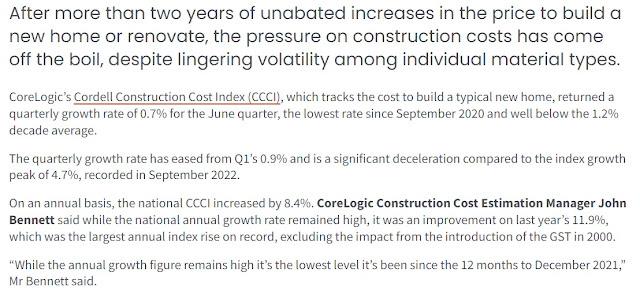| IndyWatch Australian Economic News Feed Archiver | |
 |
Go Back:30 Days | 7 Days | 2 Days | 1 Day |
|
IndyWatch Australian Economic News Feed was generated at Australian News IndyWatch. |
|
Wednesday, 19 July
18:46
Bank of England breathes a sigh of relief Pete Wargent Daily Blog
18:19
RBA interest rate rises are inflationary and neoliberal privatisations have reinforced that William Mitchell Modern Monetary Theory
Modern Monetary Theory (MMT) economists have argued from the outset that using interest rate rises to subdue inflationary pressures may in fact add to those pressures through their impact on business costs. Businesses with outstanding trade credit or overdrafts will use their market power to pass the higher borrowing costs on to consumers. In more
16:42
Concerns over slow progress of Global Pandemic Agreement amid splintering of discussions AFTINET
July 19, 2023: Global Pandemic Agreement discussions aimed at ensuring equitable access to medicines in the case of a future global health emergency have resumed this week at the World Health Organisation (WHO).
The agreement aims to avoid a repeat of the "catastrophic moral failure" of the Covid pandemic, when delaying tactics by a few high-income countries meant it took 20 months for members of the WTO to agree to a change to patent rules for COVID vaccines to allow for more equitable vaccine distribution. A watered-down agreement was only reached in June 2022, by which time research shows that over a million lives may have been lost through lack of access to vaccines.
An early draft of the Global Pandemic Agreement included a commitment to reserve up to 20% of any tests, vaccines or treatments for low-income countries in a future global health emergency but negotiations so far have been slow and fraught. Tensions between low-income countries, arguing for more equitable medicine access, and high-income countries seeking to protect the interests of their pharmaceutical companies have continued.
Efforts by the negotiators to create a more concise initial draft has been met with backlash over the perceived influence of high income countries in the weakening of initial commitments to health equity.
AFTINET, civil society groups and public health experts have called for the Global Pandemic Agreement to include:
- Temporary waivers of WTO rules on patent and other intellectual property rights to enable global medicines production at affordable prices for low-income countries;
- The incentivisation of transfer of manufacturing technology for pandemic-related products in low and middle-income countries;
- Public funding for research and development of pandemic-related products to be made conditional on open licensing and sharing of intellectual property, technology and know-how, and include terms and conditions in contracts related to prices of products.
...
07:59
Canada's inflation falls to 27-month low Pete Wargent Daily Blog
07:31
What's driving the surge in property listings? Pete Wargent Daily Blog
07:13
How Indonesia Manages the Risks of Foreign Investment Pacific Money The Diplomat
Diversification of investment partners has been the key to the strategy pursued by President Joko Widodo's administration.
Go Back:30 Days | 7 Days | 2 Days | 1 Day
Tuesday, 18 July
23:18
Post-pandemic Principle #5: Understanding your most valuable asset of all Pete Wargent Daily Blog
Post-pandemic principles
In this short blog post and video, I look at the 5th post-pandemic principle, as the next part in this mini-series.
Tune in here (or click on the image below):
---
Reuters reported today that LendLease is looking to shed 10 per cent of its 7,800-strong global workforce, as part of a plan to 'rightsize' its workforce and focus on lower-risk projects.
Bond yields took a turn lower through the day.
17:21
Monday Message Board (running late) John Quiggin
Post comments on any topic. Civil discussion and no coarse language please. Side discussions and idees fixes to the sandpits, please.
Im now using Substack as a blogging platform, and for my monthly email newsletter. For the moment, Ill post both at this blog and on Substack. You can also follow me on Mastodon here.
13:10
Borrow, Print, Repeat Daily Reckoning Australia
Previously, weve looked too at what the feds have to push with carrots and sticks and the way the two political parties have come together to get more of them.
But the carrots are running out. The US has added US$27 trillion to its debt so far this centuryUS$1 trillion in the last five weeks. Thats money it spentbut didnt have.
And now the Fed is trapped between inflate or die. It must now continue to inflate its economyor its bubble economy will die.
But waitthe headlines tell us that inflation is beaten.
CNN: Inflation fever is finally breaking. The Feds soft landing may be in sight:
If Fed Chair Jerome Powell were any less buttoned up, hed be well within his rights to call a press conference, stride up to the lectern in a t-shirt and board shorts and say three words soft landing, jerks! before dropping the mic and walking out.
For context, a year ago the CPI peaked at 9.1% the worst inflation in more than 40 years. [Now, its half that level.]
That is, to be clear, fan-freakin-tastic.
(For the record, the Fed has a 2% target for inflation. And while the CPI gets more headlines, central bank officials favour a different inflation gauge, the Personal Consumption Expenditures price index. The most recent core PCE index reading was 4.6% in May.)
For the record, in other words, it isnt so fan-freakin-tastic after all.
Up, up and away
Inflation is 130% above the Feds target. Prices are far higher than they were two years agoand theyre still going up.
Inflation is always and everywhere a political phenomenon. And if the Feds continue to spend trillions of dollars more than they receive in taxesthey will have to get the money somewhere. Either borrowing or printing. Borrowing pushes up interest rates and crimps the economy leading to lower tax receipts and the need to borrow even more. That leaves only two real choicescutting back on spending or inflating the currency.
But budget cuts run into the brick wall of the US late, degenerate political system. Everybody wants more. Nobody wants less. Republicans no longer oppose the carrots. Democrats no longer abhor the sticks. Instead, the elite of both parties want more of both.
So, inflation is not going away. The Feds will print. And the money will lose value almost as fast as it is created. That is the lesson from countless experiments with overspending and printing press money. There is no reason to expect a different outcome this time.
The road to ruin
But its not just the money. There are two major ways to destroy a great nation inflation and war. Thats where the sticks become deadly. And last week, the US showed up in Vilnius with a...
13:10
First the Crescendo, Then the Collapse Daily Reckoning Australia
BusinessWeeks cover story in August 1979, wasThe Death of EquitiesHow Inflation is destroying the stock market.
|
|
|
Source: Business Week |
With hindsight, we can have a little chuckle at the premature reading of the markets last rites. However, the cover story is a simple, but highly effective example of social mood.
Most people dont realise that by August 1979, the US market (S&P 500) had gone nowhere for more than a decade.
Investors had been ground down and could see no end in sight to this misery.
And, as the chart shows, after August 1979, investor despair continued for another three yearsfinally bottoming out in 1982
|
|
|
Sou... |
12:08
Australian petroleum lobby advertisement banned over 'cleaner' natural gas claim "IndyWatch Feed Economics"
A rare penalty for misleading environmental claims has seen a television commercial for Australia's petroleum association cut from the airwaves.
02:59
Growth in Australian construction costs lowest since 2020 Pete Wargent Daily Blog
Monday, 17 July
18:16
Starmer must confront the reality more spending will be required but taxes will probably also have to be higher William Mitchell Modern Monetary Theory
The question is when is a Labour Party a Labour Party? The answer is: When it is a Labour Party! Which means when it defends workers interests against capital and when it defends families against pernicious neoliberal cuts or constraints on welfare. Which means, in turn, that the British Labour Party is a Labour Party
18:09
National Australia Bank joins crypto exchange boycott, cites scams "IndyWatch Feed Crypto"

National Australia Bank is the latest bank to announce blocks on certain cryptocurrency exchanges, citing the high risk of scams.
17:55
Reserve Banks loses leverage Crispin Hull

Spare a thought for the new Governor of the Reserve Bank, Michelle Bullock. In the past few days many have reflected on the mistakes of out-going Governor Philip Lowe, sometimes comparing him to earlier Governors who seemed to use the interest-rate lever with more finesse.
But the more likely explanation is not that Lowe made mistakes by holding rates too high for too long to meet a non-existent wage spiral; holding rates too low for too long fearing an economic crash that did not happen; and then jacking them up too high too quickly.
Rather it is that Lowes governorship coincided with changes in the Australian economy that made the interest-rate lever a much less predictable tool. And it will not be any different for Bullock.
Treasurer and later Prime Minister Paul Keating frequently referred to the economic levers. Pull or push a lever and the train would speed or slow. You could hand the train over to an independent Reserve Bank to push or pull that lever so the train would not derail but stay on the track.
But the Australian economy is now much less like a train on a fairly predictable track and more like, say, an aircraft requiring a lot more levers controlling not just speed but also sideways and vertical motion.
It is a more complex and different economy. You cannot, as in the past, just increase interest rates and expect household demand to tighten and for firms to respond by decreasing prices to continue to attract custom with a concomitant reduction in inflation.
Several big differences between the 2020s and earlier decades come to mind: Covid; different corporate behaviour; new household sources of money; different consumer responses; and employment arrangements.
Covid taught households to stock up; to save for rainy days; to spend more wisely. But only up to a point, and in erratic and unpredictable ways. The corporate response to Covid was to take advantage of the panic engendered by the fear of not having the full array of goods available immediately. Demand was inelastic: we must have toilet paper; we must have our 4WD; or whatever goods we need and we will pay whatever is necessary.
So, prices did not fall in a depressed market, dampening inflation. Rather, savings and other assets...
12:13
Australia-EU FTA talks stalled over agricultural exports and GIs, may resume in August AFTINET
July 17, 2023: Trade Minister Farrell and Prime minster Albanese announced last week that EU concessions in negotiating the Australia-EU FTA were not good enough and that Australia would not sign a deal unless it had real commercial benefits for Australia.
Australia wants more access for Australian lamb, beef and other agricultural exports and rejects the EUs refusal to allow Australian producers to use names like prosecco and feta cheese (Geographical Indications).
EUs market of over 400 million people gives it greater bargaining power, but the EU also wants access to Australias critical mineral deposits, which are needed for production of batteries and other products for the transition to clean energy. EU representatives have also said more work was required to address these key outstanding issues. Minister Farrell commented that there was possibility of further talks next month.
The DFAT website reports that talks have concluded on other key areas of concern to AFTINET. We do not yet know if earlier EU proposals for longer monopolies on medicines have been removed, and whether the commitments on labour rights and environmental standards, including commitments on reduction of carbon emissions, are fully enforceable in the same way as other commitments in the agreement.
However, the details of these commitments will not be revealed until after the deal is concluded. The EU has a policy of releasing and publishing independent evaluations of the texts of trade agreements after they are concluded but before they are signed. The Albanese Labor government has a policy for a more open process, including independent evaluation of agreements before they are signed. The EU agreement will be their first chance to put this policy into practice.









